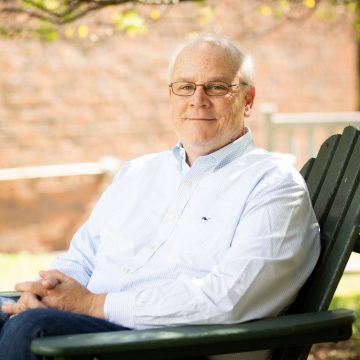George O’Toole, PhD, a professor of microbiology and immunology at Dartmouth’s Geisel School of Medicine, has been named the Elmer R. Pfefferkorn, PhD, Professor of Microbiology and Immunology at Geisel. The appointment recognizes O’Toole’s outstanding contributions to microbiology and immunology both as a scientist and mentor to students over his 20-year career at Dartmouth.

O’Toole is the second Geisel faculty member to receive this honor. William R. Green, PhD, whose distinguished tenure at Dartmouth has included serving as dean of Dartmouth Medical School and chair of the Department of Microbiology and Immunology, was named the inaugural Elmer R. Pfefferkorn Professor in 2009.
The professorship was established to honor Pfefferkorn, an emeritus professor and former chair of microbiology and immunology, for his commitment to the medical school for more than 45 years. A pioneer in the fields of parasitology and virology, as well as a legendary and beloved teacher, Pfefferkorn died in March of 2019 at the age of 87.
“I’m incredibly honored,” says O’Toole. “I got to know Elmer when I was a young assistant professor, my lab was right next to his, and he was always very supportive as a senior faculty member and really as a role model for me. Seeing how he focused on his science for a long and incredibly productive career, he might be the most impactful member of the Geisel medical school faculty in history. To this day, people still rave about his lectures.
“His contributions to the field of parasitology, nationally and internationally, were equally impressive,” O’Toole says. “But despite all of his accomplishments, he was incredibly humble. Elmer was just an amazing man.”
"George's research has provided great insights into the communal behavior of bacteria in biofilms,” says Duane Compton, PhD, dean of the Geisel School of Medicine. “His work has spanned from basic genetics of biofilm formation to clinical translation in how biofilms form in lungs of affected individuals. In pursuit of his research mission, he has also been an exemplary mentor for graduate students and postdoctoral fellows. It is wonderful to honor George with a professorship named after one of the luminaries of Geisel.”
The O’Toole laboratory has been a leader in advancing the understanding of how bacteria transition from a free-swimming state to microbial communities known as biofilms. Their studies have shed light on the surface sensing ability of microbes and how single-species biofilm communities form on living (airway cells) and non-living (medical implant) surfaces. The lab has also published extensively on the antibiotic resistance of mixed communities of microbes, particularly those associated with chronic infections in the airways of cystic fibrosis patients
O’Toole’s administrative and mentoring responsibilities include serving as the associate director of the Cystic Fibrosis Foundation (CFF)-funded Research Development Program (RDP) and principal investigator of a NIH/T32-funded training program. He is also the director of graduate studies for Microbiology and Immunology and directs the CFF-RDP Training Core. He received Dartmouth’s Graduate Faculty Mentor Award in 2008.
O’Toole’s numerous honors include: the National Science Foundation Career Award, Dupont Young Investigator Award, and Pew Scholar in the Biomedical Sciences; election as a Fellow of the American Association for the Advancement of Science and the American Academy of Microbiology; and serving as editor for the Journal of Bacteriology. He is also currently the co-director of the Microbial Diversity course at the Marine Biological Laboratory.
A member of the Geisel faculty since 1999, O’Toole received his BS degree from Cornell University and his PhD from the University of Wisconsin-Madison, followed by post-doctoral research at Harvard Medical School as a Damon-Runyan and Hood Fellow.
Founded in 1797, the Geisel School of Medicine at Dartmouth strives to improve the lives of the communities it serves through excellence in learning, discovery, and healing. The Geisel School of Medicine is renowned for its leadership in medical education, healthcare policy and delivery science, biomedical research, global health, and in creating innovations that improve lives worldwide. As one of America’s leading medical schools, Dartmouth’s Geisel School of Medicine is committed to training new generations of diverse leaders who will help solve our most vexing challenges in healthcare.